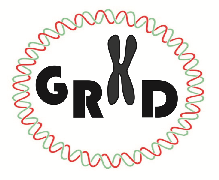Center for Gene Regulation in Health and Disease (GRHD)
Mailing Address
Center for Gene Regulation in Health and Disease (GRHD)
2121 Euclid Avenue, SR 259
Cleveland, OH 44115
Campus Location
2351 Euclid Avenue
Science and Research Building, Room 259
Phone: (216) 687-2516
Fax: (216) 687-5549

Dr. Roman Kondratov

Professor, Associate VP for Research
Location: SR 270/PH 210
Phone: (216) 523-7199/687-5171
Fax: (216) 687-6972
Biological clocks regulate organism physiology and behavior. The circadian clocks are one class of such clocks, which generate 24 hr rhythms in order to adapt to 24-hour light/dark cycle. It was known for years that the circadian system controls many behavioral processes such as daily locomotor activity and sleep/wake cycle. What was emerging over last years is that the circadian clock is key regulator of metabolism, cardiovascular physiology, immune and stress response systems.Our laboratory was instrumental in establishing a connection between the circadian clock and aging.
We have reported that knockout of the key circadian protein BMAL1 results in syndrome of early aging in mice - the significantly reduced life span (9 months for knockout vs. 28 months for wild type animals) and the development of multiple age-related pathologies (such as sarcopenia, osteoporosis, reduction of subcutaneous adipose tissue, decreased hair growth, cataracts, cornea inflammation, etc.).
Being a transcriptional factor, BMAL1 may orchestrate or influence many metabolic pathways in the organism. Therefore, different mechanisms may be responsible for aging and for the development of particular pathologies in BMAL1 deficient animals. Currently we have several projects related to the study the role of BMAL1 and circadian clock in the regulation of aging. One direction is study of aging associated signaling pathways such as TOR signaling pathways, Sirtuin signaling pathway and insulin-like growth factor/insulin-like growth factor receptor (IGF/IGFR) pathway. All these pathways play important role in cell metabolism and proliferation and organism response to nutrients and stress. These pathways are tightly regulated and disruption of the regulation is the major determinant of aging and age-related pathologies.
Another interest of the laboratory is circadian clock dependent mechanisms of dietary restriction. Dietary restriction and calorie restriction particularly is one of the most powerful interventions, which extend longevity in different organisms including mammals. We found that calorie restriction significantly affect circadian rhythms in gene expression and that functional circadian clock is necessary for lifespan extension by calorie restriction.
Stem cell homeostasis is implicated in the control of aging. We are concentrated on circadian clock mechanisms in mesenchymal stem cells and, specifically, on the role of clock proteins in osteoblast differentiation. This research will help to establish involvement of the circadian clock in such age associated pathology as osteoporosis.

Postdoctoral Fellow
Location: SR271
216-523-7199

Graduate Student
Location: SR271
o.ebeigbe@vikes.csuohio.edu

Graduate Student
Location:
SR271
a.astafev@vikes.csuohio.edu
Jonathan Fritz
Graduate Student
Location: SR27
Vloha Mezhnina, PhD,
Alumni, Research Fellow, Currently Research Associate Cedars-Sinai Hospital
Location: SR271
Makayla Dillon
Alumni, Graduate Student, Currently CWRU Dental School
Sonal Patel
Alumni, PhD Student 2010-2016, Currently Research Scientist
Location: SR271
William Samsa
Alumni, PhD Student, 2010-2016, Currently Research Associate Cleveland Clinic
Location: SR271
Yuliya Dubrovsky
Alumni. Research Technician 2007-2013, Current position Occupational Therapist
Location: SR271
Rohini Khapre
Alumni, PhD Student 2009 - 2014, Currently postdoc fellow at Cleveland Clinic
Location: SR271
Kuldeep Makwana
Alumni, PhD student 2013-2018, Currently Research Associate Cedar Sinay Hospital
Amol Chaudhari
Alumni, PhD student 2012-2017, Currently Research Scientist
Richa (Gupta) Tulsian
Alumni, PhD student 2013-2018, Currently Research Scientist
Shomo Gosh
Alumni, PhD student 2014-2018, Currently Health Care Manager
Selected publications (in chronological order)
Peer-reviewed articles:
- Kondratov R.V*., Kondratova A.A., Gorbacheva V.Y., Vykhovanets O.V. and Antoch M.P. Early aging and age-related pathologies in mice deficient in BMAL1, the core component of the circadian clock. (2006) Genes and Development, 20(14), 1868-1873
- Kondratov R.V. A role of the circadian system and circadian proteins in aging. (2007) Ageing Research Review, 6(1), 12-27
- Kondratova A.A. & Kondratov R.V. (2012) Circadian clock and pathologies of ageing brain. Nature Reviews Neuroscience 13, 325-335
- Khapre RV, Kondratova AA, Patel S, Dubrovsky Y, Wrobel M, Antoch MP, Kondratov RV. (2014) BMAL1-dependent regulation of the mTOR signaling pathway delays aging. Aging (Albany NY). Jan;6(1):48-5
- Patel SA, Chaudhari A, Gupta R, Velingkaar N, Kondratov RV. (2016) Circadian clocks govern calorie restriction-mediated life span extension through BMAL1- and IGF-1-dependent mechanisms. FASEB J. Apr; 30(4), 1634-42, pii: fj.15-282475.
- Chaudhari A, Gupta R, Patel S, Velingkaar N, Kondratov RV. (2017) Cryptochromes regulate IGF-1 production and signaling through control JAK2 dependent STAT5B phosphorylation. Mol Biol Cell. Mar 15, 28(6) 834-842
- Tulsian R, Velingkaar N, Kondratov R. (2018) Caloric restriction effects on liver mTOR signaling are time-of-day dependent. Aging (Albany NY). Jul 16;10(7):1640-1648. doi: 10.18632/aging.101498
- Makwana K, Gosai N, Poe A, Kondratov RV. (2019) Calorie restriction reprograms diurnal rhythms in protein translation to regulate metabolism. FASEB J Mar; 33(3): 4473-4489. doi: 10.1096/fj.201802167R. Epub 2018 Dec 19.
- Velingkaar N, Mezhnina V, Poe A, Makwana K, Tulsian R, and Kondratov RV. (2020) Reduced caloric intake and periodic fasting independently contribute to metabolic effects of caloric restriction. Aging Cell. Apr: 19(4), e13138
- Mezhnina V, Pearce R, Poe A, Velingkaar N, Astafev A, Ebeigbe OP, Makwana K, Sandlers Y, Kondratov RV. (2020) CR reprograms acetyl-CoA metabolism and induces long-chain acyl-CoA dehydrogenase and CrAT expression. Aging Cell. Nov: 19(11), e13266. doi: 10.1111/acel.13266
- Velingkaar N, Mezhnina V, Poe A, Kondratov RV. (2021) Two-meal caloric restriction induces 12-hour rhythms and improves glucose homeostasis. FASEB J. Feb; 32(2):e21342. doi: 10.1096/fj.202002470R
- Ghosh S, Lewis KN, Tulsian R, Astafev AA, Buffenstein R, KondratovRV. (2021) it’s about time; divergent circadian clocks in the liver of mice and naked mole-rats. FASEB J. doi.org/10.1096/fj.202100116R
* - co-correspondence author.
Mailing Address
Center for Gene Regulation in Health and Disease (GRHD)
2121 Euclid Avenue, SR 259
Cleveland, OH 44115
Campus Location
2351 Euclid Avenue
Science and Research Building, Room 259
Phone: (216) 687-2516
Fax: (216) 687-5549
